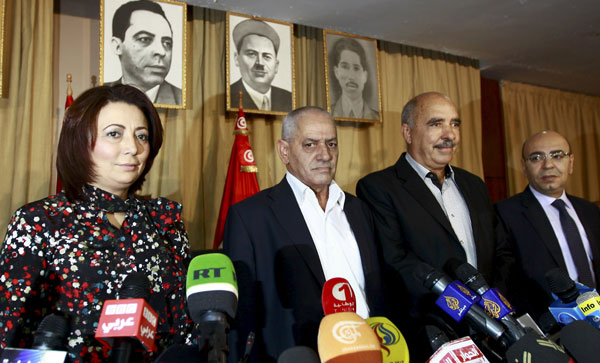Tunisian mediator group wins Nobel Peace Prize
Updated: 2015-10-09 19:52
(Agencies)
|
|||||||||||
 |
|
President of the Tunisian employers union Wided Bouchamaoui, Secretary General of the Tunisian General Labour Union, Houcine Abassi, President of the Tunisian Human Rights League Abdessattar ben Moussa and the president of the National Bar Association, Mohamed Fadhel Mahmoud (L-R), arrive for a news conference in Tunis, in this September 21, 2013 file photo.[Photo/Agencies] |
OSLO/TUNIS - Tunisia's National Dialogue Quartet won the Nobel Peace Prize on Friday for "its decisive contribution to the building of a pluralistic democracy in Tunisia," an example of peaceful transition in a region otherwise struggling with violence and upheaval.
The quartet of the Tunisian General Labour Union (UGTT), the Tunisian Confederation of Industry, Trade and Handicrafts (UTICA), the Tunisian Human Rights League (LTDH), and the Tunisian Order of Lawyers was formed in the summer of 2013.
It helped support the democratisation process when it was in danger of collapsing, the Norwegian Nobel committee said in its citation.
"This is a great joy and pride for Tunisia, but also a hope for the Arab World," UGTT chief Hussein Abassi told Reuters.
"It's a message that dialogue can lead us on the right path. This prize is a message for our region to put down arms and sit and talk at the negotiation table."
With a new constitution, free elections and a compromise politics between Islamist and secular leaders, Tunisia has been held up as a model of how to make the transition to a democracy from dictatorship.
"This a brilliant example, I think Tunisia is one of the Arab countries that has done best since the so-called Arab Spring and the upheavals in that part of the world," said Ahmad Fawzi, chief U. spokesman in Geneva.
The Nobel Peace Prize, worth 8 million Swedish crowns ($972,000), will be presented in Oslo on Dec. 10.
The Norwegian Nobel Committee praised the quartet for providing an alternative, peaceful political process at a time when the country was on the brink of civil war.
"More than anything, the prize is intended as an encouragement to the Tunisian people, who despite major challenges have laid the groundwork for a national fraternity which the Committee hopes will serve as an example to be followed by other countries," it said.
Committee head Kaci Kullman Five told Reuters: "I think it's timely to put the limelight on the positive results that have been obtained in Tunisia to try to safeguard them, to try to inspire the Tunisian people to build further on this basis."
Today's Top News
IMF's Lagarde says Chinese economy is not all 'doom and gloom'
German public prosecutors raid Volkswagen offices
Russia dismisses US refusal to share intelligence in campaign in Syria
World soccer rocked by suspension of Blatter and Platini
Belarussian Svetlana Alexievich wins Nobel Prize for Literature
FIFA suspends Blatter, Platini from world soccer
Merkel, Hollande appeal to MEPs for EU unity
China adopts IMF statistical benchmark, improves transparency
Hot Topics
Lunar probe , China growth forecasts, Emission rules get tougher, China seen through 'colored lens', International board,
Editor's Picks

|

|

|

|

|

|






